Not their mothers’ mariachi: Student band has a Berkeley spin
Mariachi Luz de Oro de Berkeley touts diversity, not machismo
May 16, 2019
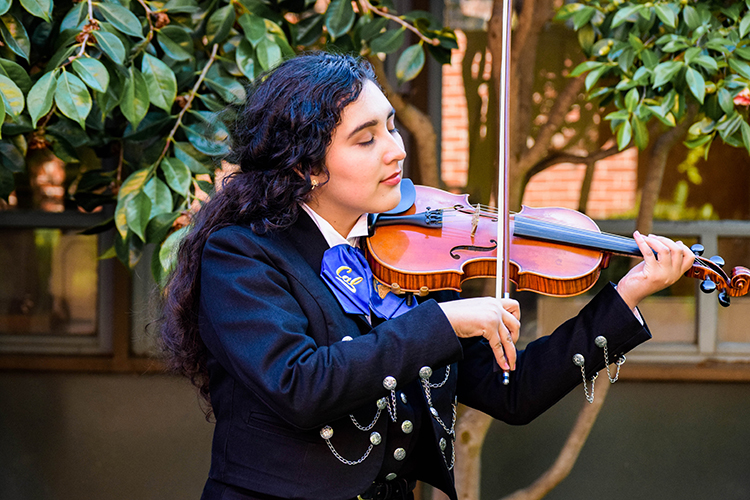
Andrea Ambriz-Alvarez warms up on her violin before Mariachi Luz de Oro de Berkeley performs at a recent graduation celebration at Alumni House. (UC Berkeley photo by Irene Yi)
Ana Gonzalez-Pulido grew up with mariachi. The distinctive music burst from the radio in her family’s Central Valley home, and her immigrant parents told her stories of the serenading, all-male bands in Mexico’s plazas — their songs, stance and traje de charro, or cowboy attire, exuding machismo.
She loved mariachi then and still does today. But the UC Berkeley sociology major, 20, is no passive listener.
Gonzalez-Pulido sings and plays violin in Mariachi Luz de Oro de Berkeley (Berkeley’s Mariachi Light of Gold), a Berkeley student group that performs traditional Mexican mariachi, in classic charro getup — but is far from conventional.
For starters, this 15-member band currently includes seven women, six students with no Mexican roots — backgrounds include Native American, Vietnamese, Salvadoran and Chinese — and a few musicians who struggle with Spanish, or don’t speak it at all.
“We’ll go line by line and say, ‘Say it with me, repeat after me,’ to help people learn the songs,” says Gonzalez-Pulido, the mariachi’s current co-chair. “It’s not a hassle. A lot of the time, even those of us who speak Spanish can’t always keep the lyrics straight!”
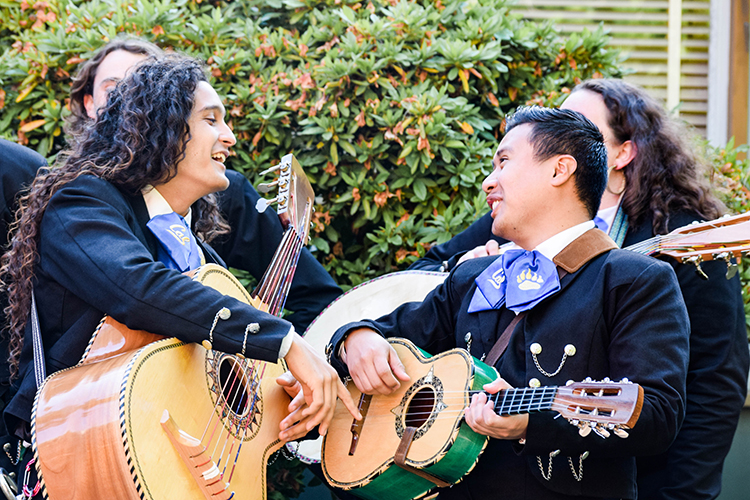
The guitarrón, played by Michael Bustillo-Sakhai (left), and the vihuela, strummed by Alx Pareja, are types of guitars played in a mariachi. (UC Berkeley photo by Irene Yi)
The performers also boast varied musical leanings, which occasionally surface in concert as flourishes of Spanish flamenco, jazz, classical and even punk rock headbanging.
“Oh, and I have really long, curly hair,” adds occasional headbanger Michael Bustillo-Sakhai, 22, a graduate student in civil engineering who plays the Mexican guitarrón, a large, deep-bodied, six-string acoustic bass. Most male mariachis keep their locks short, he says, and under sombreros.
Still, “spreading Mexican heritage” has been the close-knit group’s main goal since the band formed in 2012, says Gonzalez-Pulido. “We want others to enjoy what Mexico has to offer.”
“And, we like playing music,” adds her co-chair, Bustillo-Sakhai.

Carl Plant (left) and Michael Bustillo-Sakhai (right) help guitarist Kevin Marroquin spruce up for a performance. Plant is adjusting Marroquin’s moño, a wide bow tie that’s part of mariachis’ formal attire. The band’s bright blue moños are emblazoned with the word Cal and a bear paw print. (UC Berkeley photo by Irene Yi)
In the past few years, Mariachi Luz de Oro de Berkeley has performed at Pixar, the annual San Francisco Pride celebration, campus events, weddings and the recent, first-ever Viva Mariachi Festival at Napa Valley College. It even was invited onstage at Zellerbach Hall in 2014 to play a popular mariachi tune with the renowned Mariachi Vargas de Tecalitlán.
Drawn to the golden light
Andrea Ambriz-Alvarez’s childhood in Long Beach also was steeped in mariachi music. She played violin, yet her love of singing “was my secret,” she says. “I only sang in my house, in the shower.” Then, at Berkeley, her quest for new friends led her to investigate campus clubs. That’s how she found Mariachi Luz de Oro de Berkeley.
“I went to the first rehearsal, and they were so welcoming,” says the media studies major, 21, whose voice amazed the group, “and I felt they wanted me to stay, that they needed me.”
Other band members shared similar stories of stumbling upon the mariachi, and it filling a void.
Kevin Marroquin, a guitarist since age 10, says he was “miserable without music” as a freshman. Then, toting his guitar at Calapalooza, the annual student activities fair, the son of Guatemalan immigrants met representatives from Mariachi Luz de Oro de Berkeley. Only vaguely familiar with mariachi at the time, he is now the group’s most senior member while juggling three majors — astrophysics, geophysics and data science.
“One of the most beautiful things,” says Marroquin, 22, “is that some of my closest friends are in the mariachi.”
One of them is Bustillo-Sakhai, who, as a teen in Los Angeles County, never felt mariachi was his thing. “I didn’t like how macho the guys were,” he explains. “And, they were too performative.” He chose instead to play bass in two punk bands.
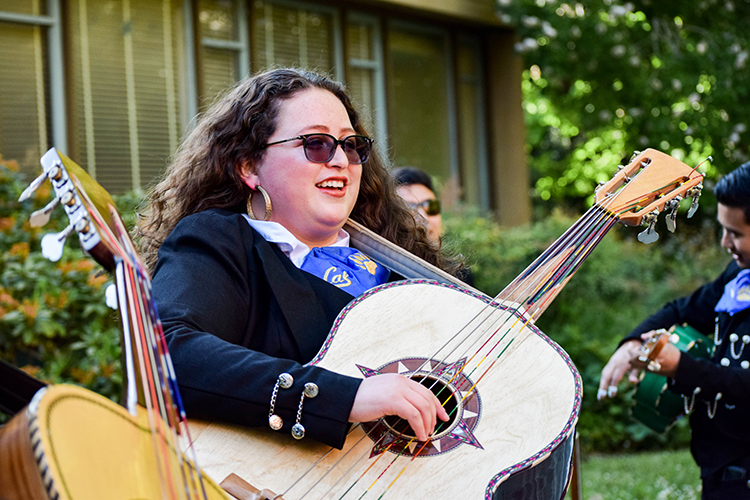
Alyssa Cazares plays the guitarrón, a large bass guitar that’s a mariachi staple. The sound produced by pulling the strings is loud and powerful. (UC Berkeley photo by Irene Yi)
At Berkeley, he and Marroquin shared the same fraternity house, where Mariachi Luz de Oro de Berkeley still practices in the basement, but no longer after crawling through a basement window — the fastest route, for a time, to their space. At first, Bustillo-Sakhai just sat quietly in the dark and watched the band’s rehearsals. “There were two singers I loved to listen to,” he recalls.
But knowing Bustillo-Sakhai was a guitarist, Marroquin left a guitarrón in his frat brother’s room to tempt him. “I was in a musical rut,” Bustillo-Sakhai concedes, “so I decided to take it on as a challenge. I learned the whole repertoire — norteñas, waltzes, huapangos and sones, different styles of music found throughout Mexico — in one summer.”
“It never felt like he was a new member. It was like he’d been with us forever,” says Ambriz-Alvarez of “Mikey.”
Carl Plant, a trumpeter urged by a friend to join Mariachi Luz de Oro de Berkeley, says he’s “fallen more and more in love with the music, and it has some great trumpet parts.” He adds that he’s also had fun singing, despite his lack of fluency in Spanish. Typically, mariachis play instruments —trumpets, violins and various types of guitars — as well as sing.
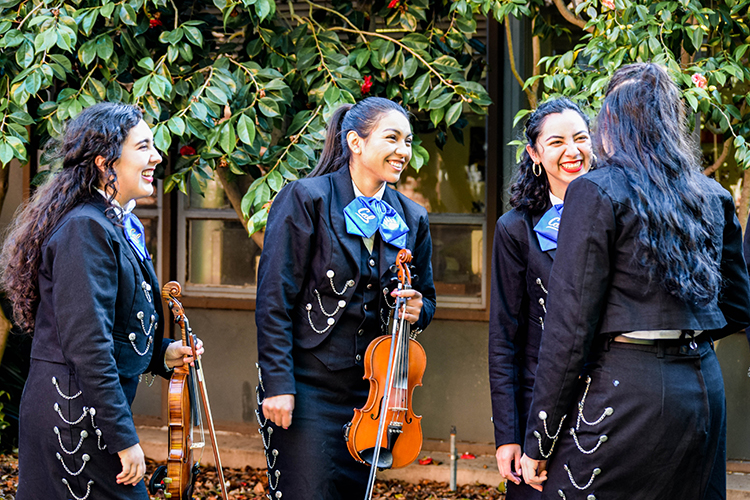
Violinists Andrea Ambriz-Alvarez (left), Karla Hernandez, Ana Gonzalez-Pulido and Lauren Sermeño are four of the seven women in the 15-member mariachi. (UC Berkeley photo by Irene Yi)
“Nobody excludes you because of your ethnicity,” 22-year-old Plant, a math major, says of the Berkeley band. “Nobody is trying to check that you have some cultural credentials. It’s also important for non-Mexican members to acknowledge and respect the space they’re taking in the group. Mariachi Luz de Oro is first and foremost about the music, but also about resisting white supremacy by celebrating Mexican culture. The fact they were ready to trust a white boy like me and welcome me speaks volumes about the strength and kindness of each and every one of them.”
Never a dull moment
Traditionally, mariachi — the word can mean the genre, the group or an individual musician — has a formal, rigid air. But Bustillo-Sakhai calls Mariachi Luz de Oro de Berkeley “freeing.” The group is egalitarian, chooses its chairs by vote, he says, and is prone to “giggling, laughing and banter in between songs.”
It also has its share of adventures at gigs. Once, while the mariachi played at an Oakland block party, says Marroquin, “cop cars suddenly started coming from everywhere and people with body armor on. It was a bust across the street. We wondered, ‘Should we keep playing?’ We just kept playing.”
Bustillo-Sakhai quips that the band felt “like it was playing a movie soundtrack.”
At a San Leandro wedding, the bride’s mother abruptly told the mariachi to stop singing and just play. She’d heard the lyrics to the musicians’ first romantic tune and considered them too suggestive for the occasion. Since most mariachi has lyrics, the request led to “what sounded like an awkward, 50-minute karaoke track,” says Ambriz-Alvarez.
“Meanwhile, the groomsmen kept heckling us to sing,” adds Bustillo-Sakhai. And the wedding’s videographer begged the band to perform a song, which he filmed in the parking lot, for his girlfriend.
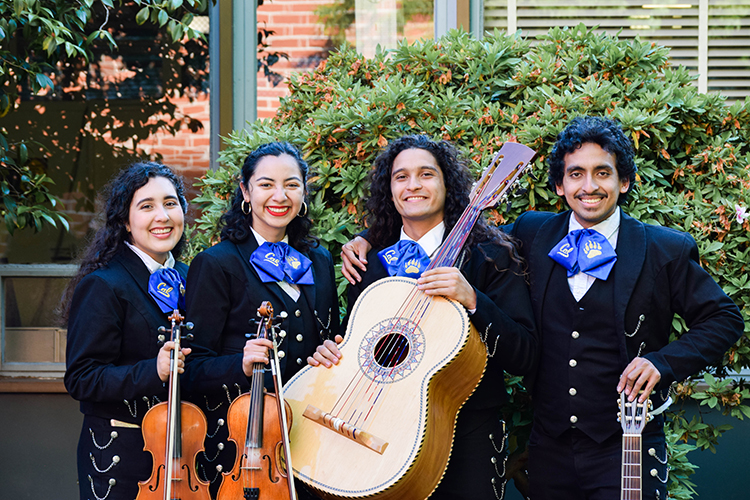
Mariachi Luz de Oro de Berkeley musicians (from left) Andrea Ambriz-Alvarez, Ana Gonzalez-Pulido, Michael Bustillo-Sakhai and Kevin Marroquin. All but Gonzalez-Pulido are graduating this month. (UC Berkeley photo by Irene Yi)
Except for the time Bustillo-Sakhai had to crawl under his car to reattach his muffler on the way to a Catholic church event, the band in tow, Mariachi Luz de Oro de Berkeley boasts crisp, clean, handsome uniforms, which it saved up to purchase a year ago.
“We were playing high quality songs, but we didn’t look the best we could,” explains Ambriz-Alvarez.
Their attire includes black pantalónes de charro (fitted trousers) and chaquetillas (short jackets) with botonaduras (silver buttons). They also ordered special bright blue UC Berkeley moños (wide bow ties) decorated with the word Cal and a bear’s paw print in gold.
Sombreros, which they can’t yet afford, are on their wish list. An ASUC student group, the mariachi gets just $500 in financial help a year and can only ask for donations at its shows, not charge fees for their time and effort.
But most of all, they need a few new members. Four musicians graduate this month — Bustillo-Sakhai, Marroquin, Plant and Ambriz-Alvarez. A fifth is leaving the mariachi for other commitments.
“There are no tryouts; we’re very inclusive,” says Gonzalez-Pulido. “It’s so much fun to play, and beautiful to watch, as well, when the violinists are all swaying their bows in the same direction, the trumpets are playing loud and the guitarists are strumming.”
“I like those intense moments when all parts of the mariachi are playing together,” agrees Bustillo-Sakhai. “The sound is really unique and powerful.”
NOTE: For information about joining Mariachi Luz de Oro, email [email protected]. Also see the Mariachi Luz de Oro website, Instagram account and the Mariachi Luz de Oro de Berkeley Facebook page.